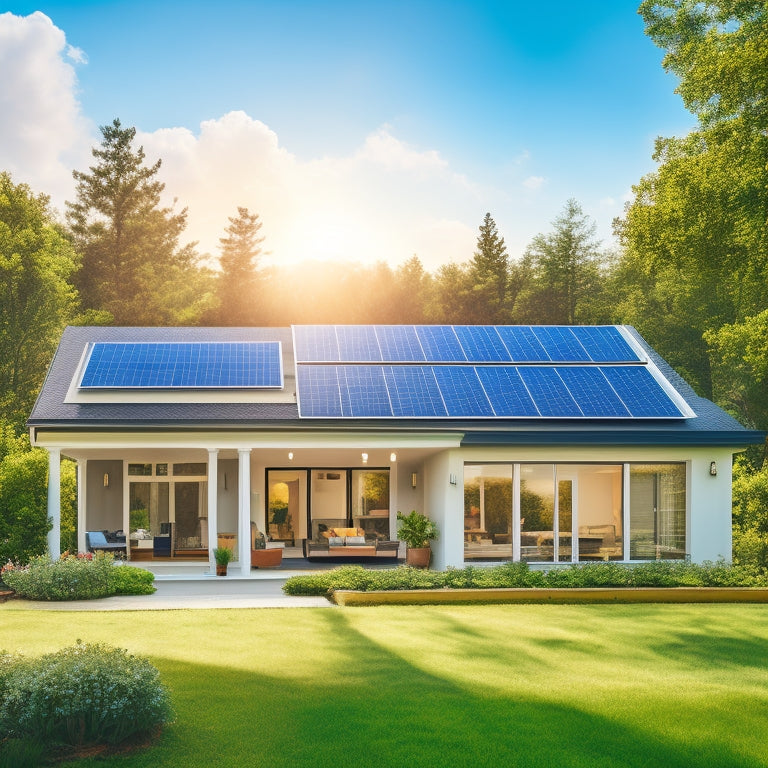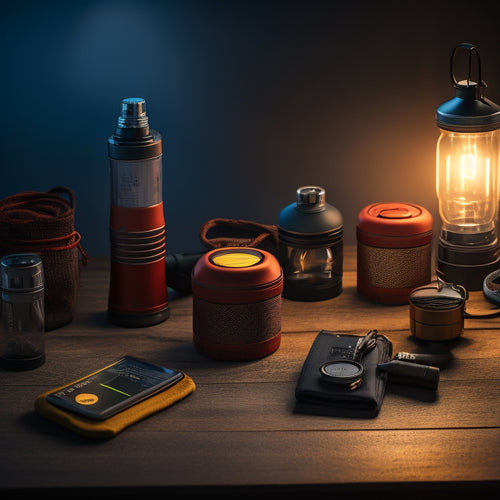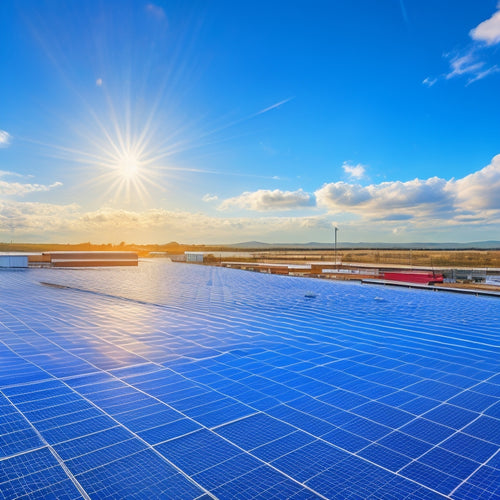
Solar Power Solutions for Homeowners
Share
You're considering solar power solutions for your home, but you want to guarantee a steady supply of electricity during outages. A solar power system without backup halts during grid failure, so it's crucial to evaluate battery systems based on capacity, depth of discharge (DOD), and cycle life. Assess your energy usage patterns and solar panel array size to determine the required battery capacity for power outages. With the right battery system, you can store excess energy from your solar panels and use it during outages or at night, achieving energy independence and cost savings. Investigate your options to find the best fit for your needs.
Key Takeaways
- Invest in a solar power backup system to ensure energy independence during grid failures and outages.
- Assess your energy usage patterns and solar panel array size to determine the required battery capacity for power outages.
- Evaluate battery technology options, such as lead-acid and lithium-ion, based on factors like charging efficiency and cycle life.
- Consider hybrid systems that combine solar power with generators or grid-tie systems for reliable backup and energy independence.
- Regular maintenance, including software updates and cleaning solar panels, is crucial for optimal performance and system lifespan.
Understanding Solar Power Backup
When the grid goes down, your solar power system comes to a standstill, leaving you in the dark - unless you have a solar power backup system in place. This backup system guarantees you maintain grid independence, even when the grid fails.
Without a backup, your solar panels cease to function, and you're left relying on traditional power sources. A solar power backup system allows you to store excess energy generated by your solar panels during the day, providing a reliable source of power when you need it most.
Consider evaluating battery systems based on capacity, depth of discharge (DOD), and cycle life for energy autonomy high-performance solutions, and prioritize durability, scalability, and features like remote monitoring.
This means you can maintain solar panel efficiency and continue to power your home, even in the event of a grid outage. By investing in a solar power backup system, you're taking an essential step towards achieving true energy independence.
Choosing the Right Battery System
Now that you've decided to invest in a solar power backup system, it's time to select the right battery system to meet your energy needs.
When choosing a battery system, take into account your energy usage patterns and the size of your solar panel array. You'll want to determine the required battery capacity to guarantee your energy needs are met during power outages.
Look for batteries with high charging efficiency to minimize energy losses. Additionally, evaluate the type of battery technology, such as lead-acid or lithium-ion batteries, which offer high energy density and long cycle life, making them ideal for small-scale installations.
It's also crucial to assess the depth of discharge (DOD) and compliance with solar regulations (IEC standards) to guarantee peak performance.
Solar Power Backup Options
Solar Power Backup Options
Several solar power backup options are available to homeowners, each catering to specific energy needs and budgets. You can consider a battery-only system, which provides energy independence during power outages. Alternatively, you can opt for a generator-battery hybrid system, which offers a reliable backup power source. If you have existing solar panel types, you can integrate them with a battery system for a thorough backup solution.
| Backup Option | Description |
|---|---|
| Battery-Only System | Provides energy independence during power outages |
| Generator-Battery Hybrid System | Offers a reliable backup power source |
| Grid-Tie System with Battery | Allows for energy independence and grid connection |
| Off-Grid System with Battery | Provides complete energy independence, no grid connection required |
Benefits of Energy Storage Systems
Energy independence is within your grasp with energy storage systems, which provide a reliable way to store excess energy generated by your solar panels for later use. This means you can power your home during grid outages or at night, reducing your reliance on the grid.
With energy storage, you'll experience cost savings by storing excess energy instead of feeding it back into the grid. By leveraging Solar-Powered Battery Backup Systems, you can also enhance energy independence, reduce reliance on fossil fuels, and guarantee a reliable power supply for critical infrastructure and essential services.
You'll also minimize your environmental impact by using clean energy. Furthermore, energy storage systems improve grid reliability by reducing peak demand and stabilizing the grid.
As technology advancements continue, system lifespan is increasing, making energy storage a worthwhile investment for homeowners like you.
Installing a Home Solar Generator
As you prepare to employ the full potential of renewable energy, installing a home solar generator is an essential step in achieving energy independence. This involves integrating a solar panel installation with a battery storage system, allowing you to capture and store excess energy for later use.
When selecting a home solar generator, consider factors such as power output, battery capacity, and compatibility with your existing electrical infrastructure. Proper generator maintenance is also vital to confirm peak performance and extend the system's lifespan.
Regularly inspect and clean the solar panels, check battery water levels, and perform software updates to assure your system operates at peak efficiency.
Frequently Asked Questions
Can I Install Solar Panels on a Shaded Roof?
You can install solar panels on a shaded roof, but be aware that shaded roof challenges will reduce solar panel efficiency; consider trimming trees or using specialized panels to minimize energy losses, and assess your roof's shading patterns before installation.
Are Solar Power Systems Compatible With All Electrical Panels?
You'll need to guarantee your electrical panel is compatible with a solar power system, which may require panel upgrades for grid compatibility; a professional assessment will determine if your panel can support the added power generation.
Do Solar Panels Require Regular Maintenance or Cleaning?
Surprisingly, you'll spend more time thinking about cleaning your solar panels than actually doing it - typically every 6-12 months. This low-maintenance requirement guarantees your solar panel lifespan isn't compromised, and you can enjoy hassle-free renewable energy.
Can I Use Solar Power During a Grid Outage Without a Battery?
You can't use solar power during a grid outage without a battery because grid-tied systems, which are the most common, shut down during outages for safety reasons, and solar inverters won't operate without a functioning grid connection.
Are Solar Power Systems a Good Investment for Renters?
You're wondering if solar power systems are a good investment for renters. Unfortunately, they aren't, since you don't own the property and can't claim financial incentives. Additionally, renters' rights often limit permanent installations, making it a costly and impractical choice for you.
Related Posts
-

Best Solar Powered Flashlights for Emergency Situations
When you're choosing the best solar-powered flashlights for emergency situations, focus on their brightness, battery ...
-

Replacing Old Appliances With Sustainable Alternatives
Replacing old appliances with sustainable alternatives can change your home into an energy-efficient space. Not only ...
-

Commercial Solar Energy
As you consider powering your business with commercial solar energy, you'll uncover it offers a triple benefit: signi...


